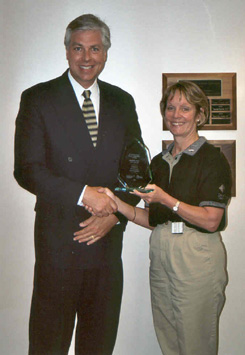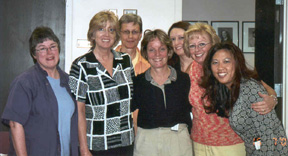 |
Bill Brandt of Novartis presents Laurel Williams with the Novartis Lifetime Achievement award. |
“She has great clinical knowledge and is extremely well-organized,” Dr. Shaw said.
And of all the people he worked with in Pittsburgh, Dr. Shaw said Laurel Williams is the most dedicated to patient care. “In many ways the entire persona of the program has been shaped by Laurie’s influence,” he said.
For her dedication, tireless work ethic and utmost concern for patients, Williams was given the Novartis Lifetime Achievement award from the North American Transplant Coordinator’s Organization in July.
The honor is bestowed on those individuals who not only demonstrate a commitment to organ donation and transplantation but also contribute to advancements in the field through literature and academic efforts.
As a transplant coordinator manager, Williams doesn’t just direct other coordinators, she also is actively involved in patient care. She follows patients through the entire process from the time they first meet with the doctors to talk about a transplant to following them post operatively in and out of the hospital.
 |
Liver and intestinal transplant nurse coordinators. |
Humbling words for Williams, who says she would not be successful at her job without the support of Dr. Shaw, the nurses, the staff and other coordinators. “I work with incredible people,” Williams said. “It’s such a huge honor to be recognized by people in the field who do the same things I do every day.”
Williams said that when she came to UNMC in 1985 everyone was extremely helpful and concerned about how to best make things work for patients and their families. “Dr. Shaw needed time to look at the surgical end,” Williams said, “so he gave me free reign to set things up how I thought it would work smoothly for the patients.”
|
“Laurie continues to be a fierce advocate for the patient, the strongest proponent of patient education and oversees the interaction of the family, the patient and the transplant program.” Michael Sorrell, M.D., medical director, liver transplantation “Laurel has helped and developed new courses for training coordinators at all levels of medical education. She has also held every position with NATCO and is still very much active in the organization.” Sara Maloley, program administrator, department of internal medicine “Laurie has helped to develop the role of the transplant coordinator into a well recognized and organized profession. As a manager, Laurie’s work ethic is beyond compare and often difficult to keep up with. She is fiercely loyal to her patients and will work for hours to fulfill her patient’s needs.” “Laurel recognized a need for affordable out patient housing for patients and their families. She and others came up with the idea for a low cost housing facility and thus the Potter’s House became a reality in June of 1991. The Potter’s House continues to be a home-away-from-home for patients and their families thanks to Laurel Williams’ ongoing support.” Marty Anthis, house manager |
One policy Williams established right away is to update the family on the progress of the surgery during the transplant procedure.
“I believe that families need to be informed all the time of what is going on,” Williams said. “This is a huge undertaking, not just for the patient but it has a big impact on the family as well.
“There are a lot of unknowns in transplantation. That makes it important for the coordinators to establish an open line of communication with the family.”
It is also just as important, she said, to let the patient and family know that they are a part of the team as well, and their input is just as important.
“Laurie tries to see things from a patient’s perspective,” said Alan Langnas, D.O., chief of transplantation. “She manages to keep the transplant team centered around that approach.”
It is this approach that led Williams to write a children’s guide to the transplant process complete with a vinyl cutout doll, which allows children to learn about the transplant process through play. “Laurie recognized that kids need more visual ways of understanding what is going to happen to them,” Dr. Shaw said.
Williams didn’t know she would become a liver and intestinal transplant coordinator when, 20 years ago, she first began working as a nurse for a children’s hospital in Pittsburgh. “I fell into this field by accident really,” Williams said.
At the time Williams, whose master’s degree is in pediatrics, was working in the College of Nursing and with children who had just come out of surgery. Eventually she began working with transplant patients.
“It’s a very dynamic field,” she said. “You are able to do some creative things and really interact with families. It is a very rewarding job.”